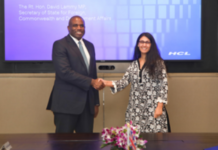New Delhi– The Department of Biotechnology under the Ministry of Science and Technology is implementing the SARS-CoV-2 NGS-BRICS consortium and multicentric programme to study the impact of severe Covid-19 conditions on TB patients in collaboration with the BRICS countries.
The SARS-CoV-2 NGS-BRICS consortium is an interdisciplinary collaboration to advance Covid-19 health-relevant knowledge and to contribute to improvements in health outcomes.
The consortium will accelerate the translation of genomic data, leading to clinical and public health research and interventions from clinical and surveillance samples by utilising the high-end genomic technologies, and epidemiologic and bioinformatics tools for future use in diagnostic assays and tracking transmission dynamics of Covid-19 and other viruses.
The Indian team consists of Arindam Maitra, Saumitra Das and Nidhan K. Biswas from the National Institute of Biomedical Genomics, Ashwin Dalal from the Centre for DNA Fingerprinting and Diagnostics, and Mohit K. Jolly from the Indian Institute of Science, along with the National Laboratory for Scientific Computation.
Ana Tereza Ribeiro de Vasconcelos from Brazil, Georgii Bazykin from the Skolkovo Institute of Science and Technology, Russia, Mingkun Li from Beijing Institute of Genomics, and Tulio de Oliveira from the University of KwaZulu-Natal, South Africa, will participate in this consortium.
The programme would investigate the impact of severe Covid-19 on transient peripheral immunosuppression and lung hyperinflammation conditions in TB patients for epidemiology and comorbidity.
This collaborative study is expected to provide valuable comorbidity data pertaining to pulmonary TB patients with or without Covid-19 co-infection that is expected to be generated for better disease management.
Renu Swarup, Secretary in the Department of Biotechnology, said that the department has taken small steps in the right direction towards collaboration with BRICS countries.
The department plans to expand the BRICS programme further, she added. (IANS)







